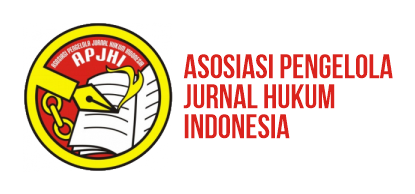DISTRIBUTION LEGALITY OF ARAK AS A BALI TRADITIONAL DRINK
Main Article Content
I Wayan D. Gotama*
I Dewa Gede Pradnya Yustiawan
This study aims to understand and determine the distribution arrangements for arak as a traditional Balinese drink. The research method uses a normative legal research type, the type of approach uses a statutory approach and a case approach. The legal materials used are sourced from primary legal materials in the form of related legislation, while other sources are from literature, journals and internet media. The technique of collecting legal materials uses document study techniques and is processed in a qualitative descriptive way. The findings of the research, specifically the regulation of the distribution of arak as a traditional Balinese drink, are regulated in the Governor of Bali Province Regulation Number 1 of 2020 concerning the Governance of Balinese Fermentation and Distillation Drinks as a form of governance for the distribution of Balinese arak. The legality of distribution of arak as a traditional Balinese drink is carried out by producers through distributors, then carried out by sub-distributors and distributed to direct sellers.
Ardyanti, P. V. D., & Tobing, D. H. (2017). Hubungan Konsep Diri dengan Konformitas pada Remaja Laki-Laki yang Mengkonsumsi Minuman Keras (Arak) Di Gianyar, Bali. Jurnal Psikologi Udayana, 4(1), 30–40.
Diantha, I. M. P., & SH, M. S. (2016). Metodologi penelitian hukum normatif dalam justifikasi teori hukum. Prenada Media.
Indrayati, P. A. (2016). Persepsi Produsen Arak di Desa Merita, Karangasem Mengenai Bahaya Keracunan Arak Oplosan yang Mengadung Metanol yang Dapat Mengancam Kesehatan dan Pariwisata di Bali. Kertha Semaya Journal Ilmu Hukum, 4(3), 1–14.
Jessica. (2021). Kajian Politik Hukum Terhadap Upaya Legalisasi Arak Bali. Jurnal Kertha Negara, 9(11), 904–915.
Mahmud, P. M. (2016). Pengantar Ilmu Hukum Edisi Revisi. Jakarta: Kencana Pranada.
Mao. (2022). Arak Bali Jadi Ikon Wellness Product Pulau Dewata saat KTT G20, Teten Masduki: Bali Bisa Menjadi Hub UMKM Go Global. https://www.nusabali.com/berita/116996/arak-bali-jadi-ikon-wellness-product-pulau-dewata-saat-ktt-g20
Muku, I., & Sukadana, I. G. K. (2009). Pengaruh Rasio Kompresi terhadap Unjuk Kerja Mesin Empat Langkah Menggunakan Arak Bali sebagai Bahan Bakar. Jurnal Ilmiah Teknik Mesin Cakra M, April, 3, 26–32.
Putra, I. N. S. A., Ardani, W., & Widani, N. M. (2022). Studi Kelayakan Home Industry Minuman Arak di Desapejeng Kawan, Gianyar. Lensa Ilmiah: Jurnal Manajemen Dan Sumberdaya, 1(1), 34–37.
Putu Hendrawan Prananta, P. Y. S. (2021). Kajian Hukum Peredaran Minuman Keras Di Bali Pasca Terbitnya Pergub Bali No. 1 Tahun 2020. Kertha Desa, 9(5), 33–334.
Ratih, G. A. M., & Habibah, N. (2022). Formulation and Analysis of Alcohol Content in Pineapple Infused Arak Bali with Gas Chromatography. International Journal of Natural Science and Engineering, 6(3), 91–98.
RP, A. A. N. Y. W., & Atmaja, G. M. W. (2016). Pengaturan Minuman Beralkohol Golongan A Bagi Pelaku Usaha Toko Modern Minimarket. Kertha Semaya: Journal Ilmu Hukum, 4(2).
Sugiarta, I. W. A., Sulandari, S., & Suargita, I. N. (2022). Implementasi Pengaturan Arak Bali Dalam Peraturan Gubernur Bali Nomor 1 Tahun 2020 Tentang Tata Kelola Minuman Fermentasi dan/atau Destilasi Khas Bali. Public Inspiration: Jurnal Administrasi Publik, 7(1), 53–59.
Syartanti, N. I., & Pidada, I. A. P. (2021). Pelegalan Arak Bali Di Media Massa Daring: Analisis Wacana Kritis. Kongres Internasional Masyarakat Linguistik Indonesia, 240–246.
Yuanda, I. N. T., Atmadja, I. B. P., & Darmadi, A. A. S. W. (2018). Tanggung Jawab Distributor Terhadap Konsumen Akhir Dalam Kegiatan Perdagangan (Studi Pada Toko Gadget Tree Bali). Kertha Semaya: Journal Ilmu Hukum.
Zanivah, D. I., Wairocana, I. G. N., & Sudiarta, I. K. (2016). Pengendalian Peredaran Minuman Beralkohol Di Wilayah Hukum Polresta Denpasar. Kertha Negara, 4(6).















